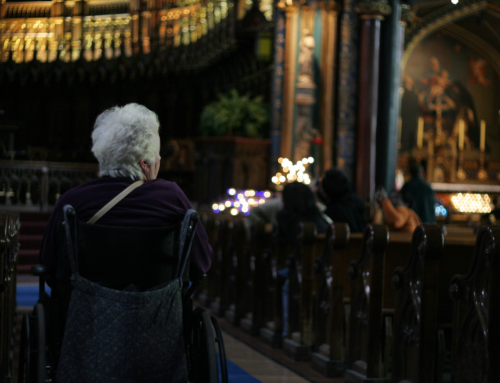
 Living in L’Arche quickly became not about serving the “poor” but about being befriended by David, Brian, Chris and Angus, people I would have previously considered so radically “different” from me to ever think of them as friends. After sharing life together their difference remained, but in L’Arche that difference did not prevent friendship but actually grounded it. The result was a revolution in the way I envisioned the human person, and all the social structures and imaginaries our culture creates around that vision.
Living in L’Arche quickly became not about serving the “poor” but about being befriended by David, Brian, Chris and Angus, people I would have previously considered so radically “different” from me to ever think of them as friends. After sharing life together their difference remained, but in L’Arche that difference did not prevent friendship but actually grounded it. The result was a revolution in the way I envisioned the human person, and all the social structures and imaginaries our culture creates around that vision.
It was in L’Arche that I first heard about the “Ashley Treatment,” a “cocktail” of medical procedures used to keep a six-year-old girl labelled as profoundly intellectually disabled “forever small.” Nothing seemed so contradictory to what I had learned in L’Arche about being human, and the case truly haunted me. I wanted to know something of the social imaginary which grounded the treatment, and how Christian ethics and the church might respond to it.
 I chose the topic for my Masters thesis, subsequently published as Reconsidering Intellectual Disability: L’Arche, Medical Ethics, and Christian Friendship. On the surface, the book is a critique of the Ashley Treatment from a Christian and ecclesial moral perspective. Yet my real goal in reflecting and writing this book was to do Christian bioethics in a way that demonstrated that Ashley and all other people deemed intellectually disabled really matter.
I chose the topic for my Masters thesis, subsequently published as Reconsidering Intellectual Disability: L’Arche, Medical Ethics, and Christian Friendship. On the surface, the book is a critique of the Ashley Treatment from a Christian and ecclesial moral perspective. Yet my real goal in reflecting and writing this book was to do Christian bioethics in a way that demonstrated that Ashley and all other people deemed intellectually disabled really matter.
Far too often these persons are theologically and culturally considered as anthropological “exceptions,” with the result that separate criteria exist in deciding what medical procedures are “appropriate” for them. Living in the peace culture of L’Arche taught me something radically different: that people like Ashley and Brian, with their nonnormative bodies and minds, are just as much persons as I or the doctors who performed the Ashley Treatment.
And perhaps even more than that – the lived vulnerability and dependence of people I met in L’Arche did not act as obstacles to friendship but may have in fact been a fundamental aspect in their invitation of me into relationships of mutuality. Late modern notions of personhood, which can include theological versions, rarely have a place for things like fragility and dependency. How might our theology, anthropology, sociology, medicine, or any other subject change by placing persons like Ashley and their friendship at the center of their morality?
The least I know is that it has transformed my own life and thought profoundly. Encountering people in L’Arche’s culture formed me in the moral imagination of the Gospel, a theological horizon that encompasses everyone as gifts endowed by the Holy Spirit with charisms to share in the Body of Christ.
You can learn more about L’Arche Daybreak at www.larchedaybreak.com
Jason’s book is available on Amazon.ca or directly from Georgetown University Press.


